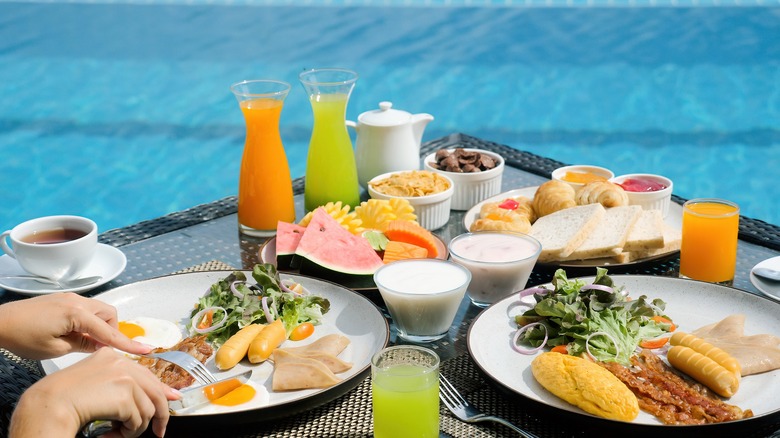Why Does Food Off Someone Else's Plate Seem To Taste Better?
We've all been there: You're sitting in a restaurant with your partner while you each eat a burger and fries. You absentmindedly reach over to steal a couple of your partner's fries, and as they protest, you realize that they seem to taste much better than your own.
You've probably heard (or even said) that other people's food tastes better than yours, which is why you crave it. While this might resonate if they're eating cookies and you're chowing down on a salad, how can you feel this way when other people are eating the exact same thing you are? It seems to be a nearly universal experience that we enjoy the food on other people's plates better than on our own, but why is this? The answer is fascinating and can give you some insight into the human psyche — but it probably won't stop you from wanting to snatch your friend's fries off their plate anytime soon.
Why do we enjoy other people's food so much?
While grabbing food off other people's plates is far from polite, there's a good reason we're inclined to do it. It all boils down to the psychology behind our connections with others.
We crave food that isn't our own because it likely tastes better to us. This has nothing to do with how the food is prepared or what it is; it's more reflective of how we feel about the person we're eating it with. Sharing experiences, like eating the same food from the exact same source, can connect us to others, and in doing so, it can heighten our senses. After all, when we steal a few French fries from our partners, we aren't just eating fries; we're subtly focusing on how both the fries and our partners make us feel. We also focus more intently on the food and the overall experience than we would if we hadn't snatched a bit of their food. The food may not be all that different from what we're eating, but the mental associations we have with that food make those flavors stand out. A happy bonus? If we enjoy the person with whom we're eating.
Does eating off of others' plates make us eat more?
Eating is an undeniably social experience. We've all had our fair share of cubicle lunches at work, but we often eat with other people. Of course, with eating companions comes that tendency to want to snatch our friends' food. But how else do we eat differently with others than we eat alone?
It turns out that we not only feel like we want others' food more, but we might actually eat more when we're around friends and family. Studies have shown that people eat up to 48 percent more when they dine with others than when they eat alone. It's all because of how we're wired — our hunter-gatherer ancestors wanted to get their fill without taking too much food from others. We tend to eat around the same amount as others, so if our hungry friends are cleaning their plates (and we're stealing some tasty bites of their food), we might end up eating significantly more than usual. That pleasant sensory experience of enjoying the food we share with others is just one piece of how we eat in social settings — a lot of it traces back to our ancestors.


